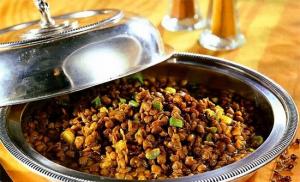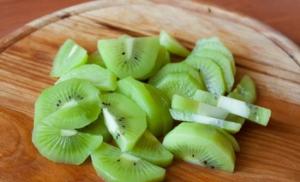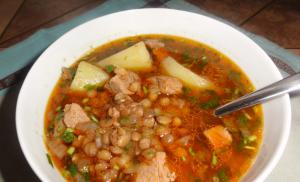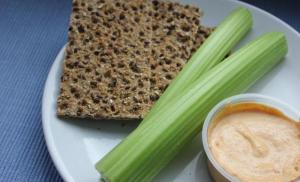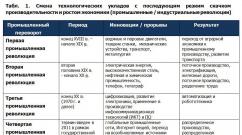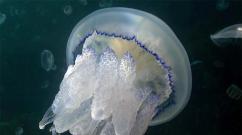What can and cannot be eaten if you have cystitis? How long to go on a diet after an exacerbation or in a chronic form of the disease.
How to eat during an exacerbation of cystitis? Which foods contribute to a quick recovery, and which ones should you avoid? You will learn about all this in the next article.
About cystitis
Cystitis – inflammatory disease, in which the walls are affected Bladder. There are 2 forms - acute and chronic. The main complaints that patients present are frequent trips to the toilet and pain when urinating. A sedentary lifestyle, sedentary work at a computer, hypothermia, and frequent constipation provoke this disease.
Getting rid of acute cystitis is quite easy, provided proper treatment. But, if the process has become chronic, comprehensive measures will be required for a complete cure.
An important component in the treatment of any cystitis is diet. Since the inflammatory process in the bladder is directly related to the functioning of the kidneys, a properly organized diet will help reduce irritation of the walls of the urinary tract. Heavy products, on the contrary, contribute to aggravation2">
How to organize your diet?
With cystitis, it is necessary to take into account the mode of operation of the kidneys: it occurs most intensely in the morning and daytime. Consequently, the most “heavy” and high-calorie foods should be consumed in the first half of the day, and for dinner it is better to eat lighter dishes.
Irritating foods will contribute to increased kidney function, and this is best avoided if you have cystitis.
Prohibited foods for cystitis
The main rule for patients is to avoid those foods that irritate the inflamed bladder. The nature of the process must be taken into account.
If cystitis is chronic, fatty, high-calorie and canned foods should be prohibited. This list also includes hot seasonings, sauces, and all smoked products.
The acute form of the disease requires more restrictions. First of all, you can add alcohol here, and also avoid salty foods. If you can’t completely remove salt from your diet, try adding just a little salt to your prepared food. Black tea and strong coffee are also undesirable drinks; it is better to drink lighter versions of these drinks if you have cystitis.
Pickled foods and spicy seasonings should be on the black list.
If you have cystitis, you should reconsider your diet
Let's summarize:
exclude spicy foods and spices;
everything is salty;
smoked products.
Complete avoidance of this food helps to alleviate the patient's condition, since irritation of the mucous membrane of the bladder decreases. This organ passes mass through itself harmful substances and removes them from the body.
Allowed products for acute cystitis
You can please the patient: there are products that improve the condition. A dairy-plant diet will benefit you. Kefir, cottage cheese, mild cheese improve intestinal microflora. The healthiest vegetables for you are zucchini, spinach, carrots and cucumbers.
A large amount of fluid (you need to drink at least 2 liters per day) helps flush out pathogens from the body. You are shown various fruit drinks, compotes, juices from vegetables and fruits, weak tea. Some “good” drinks include herbal tea made from bearberry and corn silk. Kidney tea also has a good healing effect. which is sold at the pharmacy.
IN folk medicine Much attention is paid to cranberry juice. This drink prevents bacteria from attaching to the walls of the bladder, however, you must drink at least 0.8 liters per day.
Patients benefit greatly from honey, which reduces inflammation.
Dairy products speed up the healing process
Chronic cystitis
With this disease, the scale of the process is striking: ulcers appear on the walls of the bladder. Therefore, the essence of the diet for chronic cystitis is the inclusion in the diet large quantity products with antimicrobial and diuretic effects.
Very useful are melons - melons, pumpkins, watermelons, as well as fruits - grapes, pears.
In case of chronic cystitis, you should avoid plants that contribute to bladder irritation: onions, garlic, horseradish, radishes, tomatoes, sour berries and fruits.
One of the important factors is the normalization of intestinal microflora. Constipation leads to the absorption of toxic products, which will further irritate the bladder. A large amount of fiber in the diet will help cope with this problem. Carrots, cabbage, zucchini, and other vegetables help empty the intestines and increase its tone.
For chronic cystitis, your diet should include a handful of pine nuts and olive oil(one tablespoon per day will be enough).
Sample menu
For breakfast, milk porridge, vegetable puree, cottage cheese, mild and unsalted cheese, and pasta will be useful. Preferred drinks are herbal tea, kefir, fresh juice, lingonberry or cranberry juice.
For lunch there is a first and second course. Cabbage soup, beetroot soup, soup based on cereals and vegetables are allowed, but you should not over-salt the dishes. It is also recommended to skim excess fat from the surface of the broth. For the second course, boiled vegetables, meat, steamed cutlets or meatballs, stewed or boiled fish are suitable. You can use pasta or boiled cereals as a side dish. Drinks - juice, jelly, compote or fruit drink.
Dinner should be light; you can prepare cottage cheese casserole, vinaigrette, and macaroni and cheese.
With the help of such nutrition, you will help the body cope with the disease, and also significantly reduce the recovery time.
Diagnostics and drug therapy inflammation of the bladder is not difficult for modern medicine. Based on clinical symptoms, urine analysis and, if necessary, clarifying examinations, the main risk factors and treatment regimens are identified. A diet for cystitis in women and preventive measures aimed at strengthening the immune system are an important link towards a complete cure for the disease.
The relationship between nutrition and the risk of cystitis in women has been scientifically proven. This fact is due to the peculiarities of the anatomical structure of the genitourinary system in women and the proximity of the urethra to the rectum. Neglect of drinking regime and consumption of fatty foods with insufficient fiber content leads to constipation, excess weight and congestion in the pelvic cavity.
Impaired intestinal motility and accumulation of feces can cause inflammation of the bladder or aggravate the course of the disease. The best way The treatment for constipation is to correct the diet and reduce the caloric content of food.
Another risk factor is changes in urine acidity, which varies depending on the foods consumed. Increased levels favor the proliferation of pathogenic microorganisms and irritate the epithelium of the bladder and the urethral mucosa. What should you not eat if you have cystitis? Nutritionists recommend excluding the following foods from your diet:
- chocolate;
- coffee and strong tea;
- beef and pork;
- beans and tomatoes;
- baked goods;
- spices and smoked meats;
- carbonated and alcoholic drinks;
- fast food;
- rich broths.
Products for cystitis should be selected taking into account age, health status and daily energy expenditure of the body. It is important to maintain a drinking regime; the amount of liquid should vary from 2 to 3 liters, depending on the time of year and weight.
Main goals of the diet
With a correctly selected therapeutic regimen, the acute form of the disease can be stopped within 3–5–7 days of using pharmaceutical drugs. In chronic cases, nutrition for cystitis plays a decisive role in preventing a dangerous disease. Doctors recommend switching to a gentle diet, the purpose of which is:
- elimination of intoxication;
- preventing the proliferation of pathogenic organisms;
- prevention of stone formation in the kidneys;
- reduction of irritation of the epithelium of the urinary tract;
- increasing the effectiveness of antibacterial therapy;
- increased urine outflow;
- elimination of congestion in the pelvic area.
It is necessary to follow the basic rule of all diets: in the first half of the day they consume sources of carbohydrates (cereal porridge, potatoes, fruits), then the calorie content of the diet is reduced, and the body’s needs are met through protein foods (lean poultry and fish, cottage cheese, kefir), fresh salads and vegetables steamed, stewed or baked.
Nutrition for acute cystitis
An acute inflammatory process of the bladder is accompanied by an increase in body temperature, pain in the lower quadrant of the abdomen, and impaired urine drainage. At acute cystitis the diet is aimed at quick cleansing body and removal of waste with minimal consequences for the inflamed epithelium of the bladder mucosa.
Allowed dishes during this period: pureed vegetable soups, meat and fish soufflé, stewed vegetables without tomatoes and low-fat fermented milk products. Nutritionists recommend:
- Increase fluid intake to 3 liters per day. Berry fruit drinks made from cranberries, blueberries and lingonberries are good. It is recommended to use calcium chloride mineral water 150 ml three times a day before meals.
- It is necessary to introduce watermelon, melon and vegetables into the diet that regulate water-salt metabolism in the body: cucumbers, spinach, stewed zucchini and carrots.
- For fasting purposes, on the first day of an exacerbation, it is recommended to exclude meat, fish and eggs from food; after a few days, the diet can be supplemented with mild cheese and low-fat cottage cheese.
It is recommended to add honey to chilled decoctions and teas to improve taste. The natural product has an antimicrobial and antiseptic effect, contains a complex of microelements that activate the immune system and enhance intestinal motility.
Diet for chronic cystitis
 The chronic course of the disease is characterized by alternating long-term remission with exacerbations, which provoke viral pathologies, hypothermia and weakening of the body's defenses. The diet for this form of the disease varies in duration and is aimed at improving intestinal motility, maintaining immunity and endurance. For inflammation of the bladder that occurs long time, the mucous membrane of the organ becomes swollen, loose and susceptible to the formation of ulcers. Nutritionists advise including the following foods in your diet:
The chronic course of the disease is characterized by alternating long-term remission with exacerbations, which provoke viral pathologies, hypothermia and weakening of the body's defenses. The diet for this form of the disease varies in duration and is aimed at improving intestinal motility, maintaining immunity and endurance. For inflammation of the bladder that occurs long time, the mucous membrane of the organ becomes swollen, loose and susceptible to the formation of ulcers. Nutritionists advise including the following foods in your diet:
- vegetables and fruits;
- compotes and fruit drinks from fresh berries;
- vegetable and fruit juices;
- bran and whole grain cereals;
- walnuts or pine nuts;
- olive and linseed oil;
- dairy products.
A diet for chronic cystitis is an excellent opportunity to avoid relapses and cleanse the body of toxins. Compliance with recommendations is not required special effort and financial costs, and preparing simple food will not take much time.
Juice therapy is an affordable prevention of any form of cystitis
IN for preventive purposes It is recommended to systematically consume freshly squeezed juices. The balanced mineral composition of vegetables and fruits helps strengthen the immune system, fiber stimulates intestinal motility and speeds up metabolism. Multivitamin vegetable cocktails and smoothies made from carrots, zucchini, celery, pumpkin and greens have proven themselves to be excellent. Juices from fresh raspberries, black currants and cranberries contain vitamin C, have an antiseptic effect and perfectly sanitize the urinary tract.
In order not to harm your health, fruit and vegetable juices should be consumed no more than 50 ml at a time, half an hour before meals. Prepare a healthy product immediately before consumption; in case of problems with the pancreas, any juice is diluted with water in a 1:1 ratio. The course of treatment usually lasts several weeks. After a break, juice therapy is resumed, changing, for example, fresh fruit juice to vegetable juice. To improve the taste, any juice can be diluted with juice squeezed from sweet apples.
Traditional recipes for the treatment of cystitis
 One of the important measures is to regularly take decoctions prepared from medicinal herbs, which have a diuretic, antiseptic and anti-inflammatory effect. These are various bud preparations, consisting of lingonberry leaf, bearberry, corn silk, horsetail and St. John's wort.
One of the important measures is to regularly take decoctions prepared from medicinal herbs, which have a diuretic, antiseptic and anti-inflammatory effect. These are various bud preparations, consisting of lingonberry leaf, bearberry, corn silk, horsetail and St. John's wort.
Bearberry decoction
Pour in 1 tsp. dried raw materials with a glass of boiling water, simmer over low heat or in a water bath for 10–15 minutes, let it brew, strain. Drink 30 ml one hour after meals.
Foot bath
Milk for cystitis is not only consumed as food, but also at the first symptoms of the disease, the legs are soaked in the healing product. Heat a few liters of milk, pour it into a small basin and take a bath.
Rose hip decoction
The fruits of the plant have a diuretic effect, contain vitamin C and a complex of minerals that help strengthen the body. Place 4 tbsp in a thermos. l. berries, pour 1 liter of boiling water and leave overnight. In the morning, the tea is filtered and consumed throughout the day without sugar.
Antiseptic decoction for acute cystitis
A decoction prepared from sage and St. John's wort leaves has a powerful healing effect. Herbs have a pronounced antiseptic effect, and ingestion home remedy(at least 10 days) and regular douching help cope with cystitis complicated by thrush. Raw materials are taken at the rate of 2 tbsp. l. for 500 ml of water; The decoction is consumed three times a day, and after evening hygiene care, you can do a douching procedure or take a steam bath in a warm, relaxing bath.
Basic menu
Let's look at what you can eat with cystitis and a sample menu. The main condition is to eat small meals and exclude foods that are harmful to health.
- Breakfast includes porridge cooked in water, with buckwheat and oatmeal being favorites. Boiled eggs or steam omelet are recommended. Pasta lovers can delight themselves with spaghetti made from durum wheat varieties with the addition stewed vegetables. Wash down breakfast with weak tea or berry juice.
- For lunch, it is advisable to use broths and borscht; gourmets will be pleased with the exquisite creamy soups with a delicate texture, made from broccoli, cauliflower, carrots and celery. Liquid meals stimulate metabolism, give you a feeling of fullness for a long time and are low in calories.
- An afternoon snack may include steamed cutlets, boiled meat or fish, served with salad or stewed vegetables.
- For dinner, cottage cheese casserole, yoghurts and jelly are recommended.
Between main meals it is allowed to eat fresh fruits, a handful of nuts, cereal breads, fruit drinks and herbal infusions. According to the rules of separate dietary nutrition, at least half an hour should pass between eating and drinking liquids - diluted gastric juice does not help improve digestion. Many people are concerned about the question: “How to eat during an exacerbation of the disease, when general health worsens?” To alleviate the condition and neutralize metabolic products, doctors advise carrying out several fasting days. During this period, animal proteins are completely excluded from the diet; you can eat exclusively easily digestible and low-calorie foods.
Treatment of cystitis includes a set of measures, each of which has a positive effect on the dynamics of recovery. One of these measures recommended by the attending physician is proper nutrition for cystitis, built according to certain rules.
If you formulate a correct diet and follow it in combination with drug treatment and physiotherapeutic procedures, you will be able to avoid relapses and the transition of cystitis to a chronic form.
Since the disease is most often diagnosed in women, when creating a diet, you need to take into account the peculiarities of the functioning of the female body. A properly formulated diet for cystitis in women has its own characteristics and takes into account their energy needs.
Diet goal
If you adhere to the principles of dietary nutrition, you can feel an improvement in your condition already at the beginning of treatment. The essence of the diet is the selective influence of various food components on the walls of the bladder.
Some products irritate the inflamed walls of the organ, while others have a positive effect on tissue regeneration. One cannot ignore the diuretic effect of various drinks, fruits and vegetables, and their antiseptic effect.
Expected results:
- Prevention of irritation of the mucous membrane of the urethra and bladder;
- Reducing intoxication by bacterial waste products;
- Facilitation of urination;
- Saturation of the body with vitamins and minerals;
- Reducing the proliferation of pathogenic microorganisms;
- Prevention of the spread of inflammation to other parts of the urinary system;
- Stimulating the immune response;
- Preventing the formation of kidney stones.
It is important to build a rational drinking regimen, since intensive lavage of the bladder is required to quickly evacuate microorganisms from it. The total volume of liquid drunk should not be less than 2 liters.
To fill this volume, freshly squeezed juices, green tea, infusion of strawberry leaves, sea buckthorn, and black currant are used. Cranberries, vitamin teas with rose hips, rowan, currants, and sea buckthorn are also especially useful.
How to create a menu for cystitis?

A rationally structured diet and nutrition regimen corresponds to the principles:
- Even taking into account the prohibited foods, the food contains everything necessary for the body nutrients, vitamins;
- Diet – 3 main meals with light snacks between them, or split meals up to 5-6 times in minimal portions;
- Food is steamed, all ingredients are boiled or baked;
- It is prohibited to eat foods with spices, fried, smoked, which irritate the walls of the bladder;
- You should not include processed foods or food from fast food cafes in your diet;
- The menu does not provoke constipation, but is used to prevent it;
- In cooking, a minimum of salt is used and almost no sweets are used.
Taking into account these recommendations, it is easy to create a menu for the day or even for the week - just select the desired dishes from the list below. All of them are selected in accordance with the principles of the diet and include mostly dairy and plant foods.
Daily diet for a week for cystitis:
Breakfast:
Milk porridge (), cottage cheese with pieces of berries and fruits, omelet or soft-boiled eggs, mashed potatoes or stewed zucchini, fruit juices, fermented milk drinks, green tea with honey.
Dinner:
Soups with vegetable broth, vegetable stews, steamed cutlets with a side dish of cereals, pasta casseroles, boiled or steamed meat and fish, zucchini and cucumber salads, for the third - fruit jelly, compote, mousse, fresh berries or sweet fruits .
Dinner:
Curd casseroles, fish baked in foil, pasta with cheese and seafood, bran bread, vitamin tea made from herbs or berries with honey.
Between meals, light snacks made from approved foods are allowed. The amount of liquid used should be such that urination occurs every 2 hours.
Products not allowed on the menu for patients with cystitis

The diet of patients with cystitis should not contain foods that irritate the mucous membrane of the bladder. In most forms of this disease, the mucous membrane is inflamed and needs rapid regeneration. What not to eat with primary and recurrent cystitis:
- Smoked meats, pickles, pickled vegetables, sauerkraut;
- Fatty and fried foods, lard;
- , beer, energy cocktails;
- Spices and seasonings: garlic, parsley, onion, horseradish;
- Vegetables with high content essential oils: sorrel, radish, radish, parsnip;
- Fruits with a high acid content: lemon, orange, tangerines, grapefruit, sour apples and juices from them;
- Sauces using acetic acid (mayonnaise, soy sauce);
- Butter baked goods made from refined flour;
- Sugar, saccharin and dishes using them;
- Chocolate, cocoa;
- Dishes with GMOs, dyes and preservatives;
- Full-fat milk, sour cream, cheese.
After relief of acute manifestations, patients within 2-3 weeks after subsiding acute symptoms adhere to these prohibitions. In case of recurrence of cystitis, such restrictions should be observed constantly.
List of foods to include in your diet

After studying the previous list, a reasonable question arises: what can you eat if you have cystitis, since almost everything is prohibited?
- Vegetables that have a diuretic effect: pumpkin, zucchini, cucumbers, carrots and carrot juice, celery;
- Watermelon, melon, pomegranate (has an anti-inflammatory effect), sweet pears and other fruits, grapes, persimmons;
- Fermented milk drinks: kefir, fermented baked milk, yogurt, yogurt and unsalted cheese.
- Wild berries: lingonberries, cloudberries, blueberries, cranberries;
- Low-fat varieties of fish and meat;
- , which is allowed to be eaten occasionally in case of urgent need;
- Vegetarian soups with vegetable broth;
- Whole grain porridge, bran bread, wholemeal bread;
- Olive oil – no more than 25 g per day;
- Pine nuts – a handful per day;
- Boiled eggs are occasionally allowed.
The diet of pregnant and lactating women suffering from the disease should be varied and complete, so that both the fetus and infant received enough nutrients.
How should the diet change for chronic cystitis?
The acute process is characterized by unpleasant symptoms of inflammation and symptoms of intoxication from bacterial activity. Frequent urge, temperature, pain, the appearance of blood in the urine - these manifestations prevent women from going about their business.
The main purpose of nutrition during this period is to flush the bladder to remove bacteria from the bladder and prevent irritation of its mucous membrane.

Measures to stabilize the condition:
First.
Increasing the norm of water and liquids for drinking up to 2 liters, and in case of hyperthermia - up to 2.5 liters. These are fruit juices from sweet fruits, compotes, fruit drinks, pumpkin juice, mineral calcium chloride water.
Second.
Infusions of medicinal herbs that can be drunk instead of tea or other drinks - kidney teas from lingonberry leaves, corn silk, bearberry, horsetail.
Third.
Exclusion in the primary period of meat and fish from the diet, as nutritional components that are difficult to digest by a weakened body.
Fourth.
Introduction to the diet of vegetables and melons with a diuretic and anti-inflammatory effect - carrots, zucchini, grapes, cucumbers, pomegranate juice.
In chronic cystitis with frequent relapses, the walls of the bladder and urethra are inflamed and may have ulcers on the mucous membrane and swelling. The appearance of blood and pain in the abdomen after urination characterize the sensations of patients.
The diet is almost no different from the diet during primary cystitis; the purpose of the diet is to create an antimicrobial and diuretic effect. Constipation is common at this stage, so you should have more plant fiber in your menu.
It is difficult to imagine how a sick child can refuse sweets that are prohibited for cystitis. Available substitutes are honey, natural marshmallows, marmalade in small quantities.
Treatment of cystitis is impossible without following a diet. It is important to prepare only high-quality and nutritious meals to support the body in the fight against the disease.
In addition, the diet of a patient with cystitis has specific characteristics - food and drinks should be gentle on the bladder. Compliance with these conditions will lead to complete recovery.
We’ll also show you how to create the menu correctly. We will give advice on what you can add to your diet. We will also indicate which foods are best not to eat while cystitis in women is being treated. The diet for such a disease is quite strict, since various forbidden delicacies are excluded from it.
What is cystitis anyway? This is an inflammation of the mucous membrane of the bladder. There are acute and chronic cystitis.
Forms
This disease may have different reasons occurrence. There are several types of cystitis:
- Infectious.
- Chemical.
- Allergic.
- Post-radiation and other forms.
Representatives of the fair sex can get cystitis age category. If a woman has this disease in her body, this means that she needs to adhere to special nutritional recommendations. In no case should you take your diet for cystitis lightly, as it plays an important role in the healing process.
Causes
There are the most common causes of this disease. These include:
- Hypothermia of the body, especially in the autumn and winter seasons.
- Constipation that bothers a person for a long time.
- Sitting in one place for a long time. This usually involves working at a desk. Women are often engaged in this type of activity. This category mainly includes office workers.
Cystitis in women: symptoms and treatment, diet
Poor nutrition increases the possibility of developing any disease in the human body. Therefore, you should not eat fried, salty and fatty foods. It is also recommended to monitor the amount of food a person consumes. Overeating is bad for your health. You should not eat before going to bed, it also harms the body. It is better to refuse to eat a few hours before bedtime. It will be better if dinner is light. Failure to comply with the principles of proper nutrition has a special impact on the occurrence of diseases such as cystitis, urethritis and pyelonephritis. Basically, cystitis appears suddenly and has a strong pain syndrome.

Main symptoms of the disease:
- pain in the suprapubic part;
- urination is frequent and painful;
- urine is cloudy, sometimes with blood;
- a small amount of urine comes out when urinating;
- in severe cystitis, fever and nausea, sometimes vomiting, occur.
The danger of the disease is that it can negatively affect the functioning of the kidneys. Therefore, you should not neglect this disease and, when diagnosing it, you should immediately proceed to all possible ways treatment. It is worth saying that under no circumstances should you self-medicate. This is because it may not give the desired results. As a rule, therapy for cystitis includes taking antibiotics. Therefore, it is necessary to consult a doctor so that he can conduct the necessary examination, make a diagnosis and prescribe a treatment regimen. Next, the patient will be under the supervision of a doctor. This will allow us to evaluate the effectiveness of applying health measures to the patient.
Nutritional features. What rules must be followed?
In addition to taking special medications, a diet for cystitis in women is also necessary. The fact is that if a girl eats right, her condition will improve significantly, namely, the painful sensations. This is due to the fact that the process of healing the body will be complex. The diet for cystitis in women is based on the fact that foods that are irritants are excluded from the diet. If they are removed, they will not have a negative effect on a woman’s bladder.

Another positive point in following a special diet for cystitis is that the products included in the diet contribute to the body’s diuretic processes and are antiseptics, due to which bacteria are quickly eliminated from the patient’s body. In addition to the above, there is another positive point that is associated with limiting the consumption of certain products. Due to the fact that a woman begins to monitor her diet, the load on the kidneys is reduced. Thus, a diet for cystitis in women is also beneficial for the above-mentioned organ. It is better if light foods of natural origin are included in the diet.
The bladder performs the function of removing unnecessary substances from the body. It is part of the urinary system human body. In this regard, it becomes clear that all liquid products that a person consumes ultimately pass through this organ. If a person eats incorrectly, namely, does not follow the basics healthy eating, then after a certain time the mucous membrane of the bladder may become inflamed. It is worth saying that everyone has their own characteristics of the body. They are influenced by many factors. Some people eat incorrectly for a long time and do not suffer from any diseases associated with bladder. And others are susceptible to such a disease as cystitis. In any case, you shouldn’t rely on nature and think that your body is the strongest and doesn’t care about anything. It is always better to take preventative measures than to later be treated for severe forms of any disease.

In the acute form of the disease, the walls of the bladder become inflamed. In this case, a diet for cystitis in women will help cleanse and rinse the bladder. This will ensure the removal of pathogenic bacteria from the body. Also, such rinsing will prevent irritation of the bladder walls.
Diet for cystitis in women. Options for drinks and foods that are recommended to be consumed for this disease
First of all, it is worth focusing your attention on the amount of fluid consumed in case of a disease such as cystitis. You need to drink two liters a day. This volume is recommended by doctors to establish the healing process in the human body. If a person is worried about elevated body temperature, it is recommended to increase the amount of fluid. It will be better for the body if the patient drinks two and a half liters in 24 hours.

What drinks are best to drink for cystitis?
- Compotes.
- Fruit juices.
- Vegetable juices.
- Juices or fruit drinks made from lingonberries and cranberries are considered the most beneficial for the human body who has been diagnosed with cystitis.
- Mineral water, which contains chloride and calcium.
- Herbal teas. It is recommended to drink infusions that include bearberry and corn silk. Kidney tea is also beneficial. It is better to avoid drinking tea with sugar. If you want to drink regular black, you need to make it weak.
Healthy foods
As for eating foods, it is recommended to focus on those that have diuretic properties. Below is a list of basic food recommendations that can be consumed if a diet for cystitis in women is indicated.

List of foods that can be consumed:
- Spinach.
- Carrot.
- Cucumbers.
- Zucchini.
- Melon.
- Watermelon.
- Unsalted cheese.
- Cottage cheese.
- Fish.
- Meat.
Entering additional products
A diet for cystitis and pyelonephritis in women implies that the introduction of dairy products should be done with caution in small doses.

But it’s worth knowing that with their presence in the diet, the healing process will be faster and better. After entering dairy products into the patient's menu, you can add fish and meat. It is necessary to ensure that the varieties are not fatty. It is better if it is veal or beef, steamed or boiled. Under no circumstances should you eat fried pork. It is better to give it up completely or for a certain time.
Acute form of cystitis. Features of eating and drinking
A diet for acute cystitis in women primarily involves the exclusion of drinks such as strong tea and coffee. But for liquids, better than pure water or fruit drinks, you need to drink about two liters. At first, there will be a lack of drinks and dishes to which the person is accustomed. But over time he will forget about them. Especially if the period of adherence to the diet is long. In fact, eating certain foods is a habit. It can be difficult to give them up, but it is possible. Here you need to use willpower. In the case when a person is bothered by pain, the process of giving up certain products in favor of the healing process will be much easier.

Under no circumstances should you drink alcoholic beverages if you have a disease such as cystitis, as they will aggravate the body’s condition for the worse. You should also avoid eating canned food and foods that contain dyes. You should be careful when purchasing this or that food, namely, you should look at their composition. To relieve the inflammatory process, consuming honey in small quantities will help, one teaspoon will be enough.
Features of nutrition during chronic disease
If cystitis is chronic, ulcers may be present on the walls of the bladder. Therefore, the diet for chronic cystitis in women should be aimed not only at the urinary effect, but also at providing an antimicrobial effect.
People with a chronic form of the disease need to drink herbal decoctions daily. There is a list of foods that are strictly not recommended to be eaten if you have cystitis. Because they have irritating properties. Below is a list of them:
- Garlic.
- Horseradish.
- Celery.
- Tomatoes.
- Berries with a sour taste.
It is important to monitor the functioning of the stomach and intestines. If there is any discomfort from consuming certain products, then they should be abandoned. Since they will lead to irritation of the bladder mucosa.

It is better if the patient's menu contains an ingredient such as coarse fiber. A large amount of it is present in products such as carrots, cabbage, bran and whole grain cereals. They help improve peristalsis and tone the body. Pine nuts help very well. You should not use too much of them, a small amount mixed with olive oil is enough.
How long to go on a diet after an exacerbation or in a chronic form of the disease?
What should be the diet for chronic cystitis in women? The same. When the exacerbation of the disease goes away, there is no need to give up proper nutrition. Women are advised to follow it for 12 months. Dietary nutrition will benefit both internal organs, and for the appearance of the fair sex. Perhaps in a year you will not want to give up this food system, and it will become your usual diet.
Conclusion
The state of the body during the recovery process depends on the diet for cystitis in women. It is worth remembering that proper nutrition is a component healthy image life. His overall condition depends on what a person eats. If the food is fatty and heavy, it will take a long time to digest, and problems with the stomach and intestines may arise. This will also affect the general condition of the person. A heaviness in the abdomen can lead to decreased performance, fatigue and lack of energy.
An integral part effective treatment cystitis is special diet, developed by specialists taking into account the effects of products on the human genitourinary system. Proper nutrition, should be aimed at reducing pain, active excretion of urine, eliminating inflammation in the bladder, and stimulating the immune system. It is necessary to thoroughly understand what a patient can and cannot eat with cystitis.
Meat products
During cystitis, it is better to eat lean meats prepared in the correct way, because... they contain a large amount of protein necessary to restore damaged bladder epithelium.
Prohibited use for this pathology are:
- fatty meats, especially lamb and pork;
- smoked meat products;
- salo;
- shashlik.

Meat should only be cooked in a useful way- by boiling or baking. Meat dishes from lean beef, veal, and poultry are not prohibited for consumption in the form of:
- steam cutlets;
- minced meat with vegetables;
- meatballs, etc.
At culinary processing It is forbidden to add any spices to meat dishes, as well as hot seasonings in the form of onions and garlic.
Seafood
Regular consumption of fish and seafood allows you to constantly supply the body with complete protein, vitamins E, D, A, Omega-3, magnesium and calcium, phosphorus, iron, selenium, zinc, etc.
Patients with cystitis should eat lean sea fish and seafood cooked without seasoning.
Smoked, salted, pickled and dried fish are considered prohibited products until complete recovery.
Dairy
When diagnosing cystitis, dairy products should be consumed with caution, as they create fertile ground for pathogenic microorganisms. In acute cases of the disease, doctors recommend abstaining from dairy products for several days.

As the patient's condition improves, fermented milk products should be gradually included in the daily diet. The following should be considered prohibited dairy products for the entire period of illness:
- sour cream;
- cottage cheese with high fat content;
- sharp and salty cheeses.
These products can irritate the walls of the bladder and lead to increased inflammation.

A small amount of low-fat cottage cheese is not prohibited for the patient.
A small amount of natural products - low-fat cottage cheese, yogurt, fresh kefir or fermented baked milk - the patient is not prohibited. When consuming milk, you need to focus on its tolerance to the body.
Vegetables and greens
The most useful vegetables for cystitis are those with a high fiber content and diuretic properties. These include:
- young zucchini;
- carrot;
- pumpkin with seeds;
- spinach;
- celery;
- lettuce leaves;
- eggplant;
- beets;
- fresh cucumbers.
Thanks to the diuretic effect, pathogenic microbes are removed from the body and the immune system is strengthened.
Some of the listed vegetable crops have an anti-inflammatory effect. Pumpkin porridge or stew cauliflower will help reduce the concentration of pathogenic microorganisms and eliminate the inflammatory process. Fresh herbs also have anti-inflammatory properties: parsley, dill, cumin.

Beans are one of the prohibited vegetables for cystitis.
Prohibited vegetable crops for cystitis should be considered:
- tomatoes and products based on them – tomato juice, pasta, ketchup, etc.;
- radish;
- asparagus;
- beans.
Fruits and berries
At therapeutic nutrition it is important to prevent additional irritation of the organs of the urinary system, which undergo negative changes in their structure.
Some fruits and berries along with numerous beneficial properties also include increased content fruit acids that can negatively affect the bladder and urinary tract.
Their use can lead to the development of an inflammatory process in specified bodies, increased frequency of urination, pain and deterioration of the patient’s general condition. Fruits prohibited for cystitis include:
- all cistrus fruits (tangerines, oranges, lemons, grapefruits);
- bananas;
- plum;
- cherries and sweet cherries;
- avocado;
- ginger;
- sour apples.
Berries that are not prohibited for inflammation of the urinary system are:
- watermelon;
- cranberry;
- cowberry;
- strawberry;
- black currant;
- rose hips, etc.

They not only replenish the reserves of the patient’s weakened body essential vitamins and microelements, but also actively fight infection in the genitourinary system thanks to their antimicrobial properties.
A special place in the list of fruits not prohibited for cystitis is occupied by melons (watermelons, melons) due to their high diuretic effect. Eating watermelon frequently will help:
- reduce the concentration of pathogenic microorganisms in the bladder and remove them out;
- cleanse the body of toxins and waste;
- enrich the body with glucose and sucrose to support the immune system;
- carry out prevention of urolithiasis.
Sweets
Sugar and flour contribute to the active proliferation of pathogenic microflora of the urinary system, leading to increased inflammation and exacerbation of cystitis. In this regard, it is necessary to completely abstain from cakes, pastries, cookies, preserves, jams, ice cream and other sweets for the entire period of treatment.
But to maintain the immunity of a weakened body, it is necessary to ensure the intake of sucrose and glucose into the body. This is achieved by including fruits, berries and vegetables that are not prohibited for cystitis in the daily diet.
Consuming a small amount of honey will serve as an excellent substitute for the listed prohibited sweets, provided there is no allergic reaction to this product. It can be added to cereals, herbal teas and decoctions.

This beekeeping product has antibacterial, anti-inflammatory, soothing properties, and activates the immune system.
Seasonings
All therapeutic measures taken to eliminate inflammation of the bladder will not have an effect if the prohibited irritation of the mucous membrane of the urinary organs is not eliminated. Violation of this rule will lead to an exacerbation of the symptoms of cystitis: painful and frequent urination, pain syndrome, urinary incontinence, etc.
It is important to prevent prohibited foods and dishes from being included in the patient’s daily diet. These include:
- hot sauces (ketchup, mayonnaise);
- spices (mustard, horseradish, pepper);
- seasonings;
- salty dishes.
Hot sauces, which chefs often add to various dishes to enhance their flavor, contain not only natural foods prohibited for this pathology (oils, eggs, onions, salt), but also artificial colors, preservatives, and various additives. It is also harmful for a healthy person. In the recipes of ketchups and sauces, the salt content limit is almost always exceeded.
Even a one-time meal with prohibited seasonings and spices can provoke a sharp deterioration in the condition of a person with bladder pathology and lead to further development diseases.
Beverages
Drinking plenty of fluids daily helps flush pathogenic microorganisms from the bladder and reduce their harmful effects. The daily volume of drinks and water not prohibited for cystitis should be at least 2.5 liters.

A person with problems with the urinary system should drink sufficient amounts of clean water throughout the day. Other drinks that are not prohibited for this disease may be:
- mineral still water (Esentuki 17);
- weak tea;
- herbal infusions;
- juices, jelly and compotes from permitted vegetables and fruits;
- berry fruit drinks (cranberry, lingonberry).
Drinks that are not prohibited by doctors will be beneficial if they are prepared without added sugar and from fruits, berries and vegetables recommended by nutritionists for the treatment of cystitis.
Drinks made from cranberries and lingonberries are rich in hippuric and benzoic acids, which have an antibacterial effect on the patient’s urinary system.
Indispensable in the treatment of inflammation is the regular use of rosehip decoction, which has diuretic, antibacterial, and tonic properties.
Prohibited drinks that have a negative effect on the weakened body of a patient with cystitis are:
- any low-alcohol and strong alcoholic drinks;
- coffee;
- cocoa;
- strong tea;
- kvass;
- carbonated lemonades, etc.

Drink coffee, alcohol and other listed harmful drinks the entire period of treatment of the disease is strictly prohibited. This is due to an increased irritant effect on the walls of the bladder, leading to frequent urination, pain, and rapid dehydration. For this reason, natural juices from tomatoes, plums, cherries, citrus fruits, etc. are prohibited.
By strictly adhering to the prescribed diet and drinking regimen, you can speed up the recovery process from cystitis.

